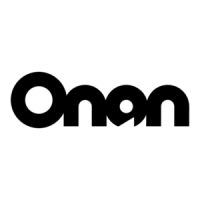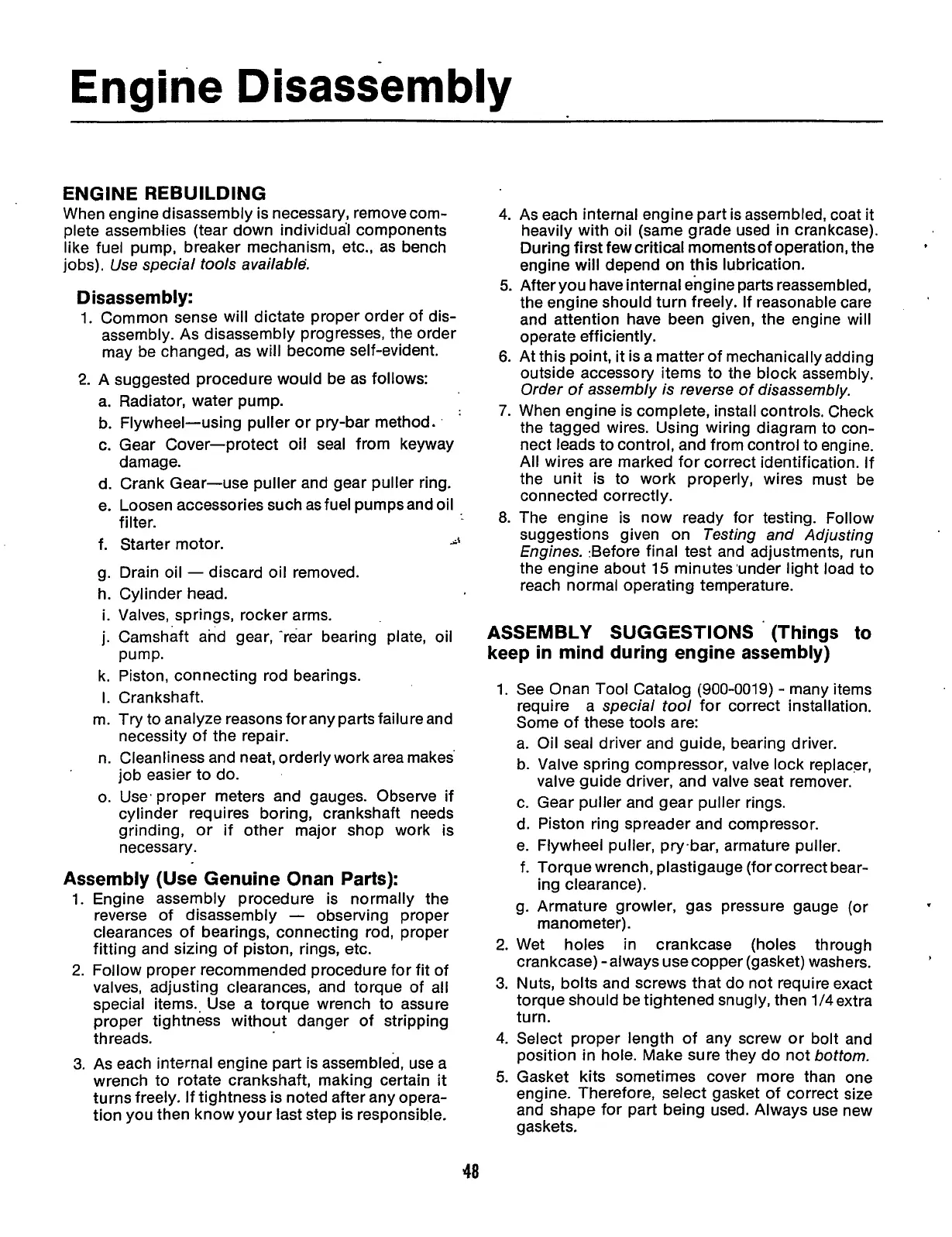Engine Disassembly
ENGINE REBUILDING
When engine disassembly is necessary, remove com-
plete assemblies (tear down individual components
like fuel pump, breaker mechanism, etc., as bench
jobs).
Use special tools available'.
Disassembly:
1. Common sense will dictate proper order of dis-
assembly. As disassembly progresses, the order
may be changed, as will become self-evident.
a. Radiator, water pump.
b.
Flywheel-using puller or pry-bar method.
c. Gear Cover-protect oil seal from keyway
d.
Crank Gear-use puller and gear puller ring.
e. Loosen accessories such as fuel pumpsand oil
f. Starter motor.
g. Drain oil
-
discard oil removed.
h. Cylinder head.
i.
Valves, springs, rocker arms.
j.
Camshaft and gear, -rear bearing plate, oil
k. Piston, connecting rod bearings.
I.
Crankshaft.
m. Try to analyze reasons for any parts failure and
necessity of the repair.
n. Cleanliness and neat, orderly work area makes
job easier to do.
0.
Use.proper meters and gauges. Observe if
cy1
i
nder req u
i
res boring
,
cranks haft needs
grinding, or if other major shop work is
necessary.
2.
A suggested procedure would be as follows:
'
damage.
f
i
I
ter.
pump.
Assembly (Use Genuine Onan Parts):
1.
2.
3.
Engine assembly procedure is normally the
reverse of disassembly
-
observing proper
clearances of bearings, connecting rod, proper
fitting and sizing of piston, rings, etc.
Follow proper recommended procedure for fit of
valves, adjusting clearances, and torque of all
special items., Use a torque wrench to assure
proper tightness without danger of stripping
threads.
As each internal engine part is assembled, use a
wrench to rotate crankshaft, making certain
it
turns freely.
If
tightness is noted after any opera-
tion you then know your last step is responsible.
4. As each internal engine part is assembled, coat it
heavily with oil (same grade used in crankcase).
During first few critical momentsof operation, the
engine will depend on this lubrication.
5.
After you have internal engine parts reassembled,
the engine should turn freely.
If
reasonable care
and attention have been given, the engine will
operate efficiently.
6.
At this point,
it
is a matter of mechanically adding
outside accessory items to the block assembly.
Order
of
assembly is reverse
of
disassembly.
7.
When engine is complete, install controls. Check
the tagged wires. Using wiring diagram to con-
nect leads to control, and from control to engine.
All wires are marked for correct identification. If
the unit is to work properly, wires must be
connected correctly.
8.
The engine is now ready for testing. Follow
suggestions given on
Testing and Adjusting
Engines.
:Before final test and adjustments, run
the engine about
15
minutes'under light load to
reach normal operating temperature.
ASSEMBLY SUGGESTIONS
'
(Things
to
keep in mind during engine assembly)
1.
See Onan
Tool
Catalog (900-0019)
-
many items
require a
special tool
for correct installation.
Some of these tools are:
a. Oil seal driver and guide, bearing driver.
b. Valve spring compressor, valve lock replacer,
valve guide driver, and valve seat remover.
c. Gear puller and gear puller rings.
d. Piston ring spreader and compressor.
e. Flywheel puller, pry.bar, armature puller.
f. Torque wrench, plastigauge (for correct bear-
g. Armature growler, gas pressure gauge
(or
2.
Wet holes in crankcase (holes through
crankcase) -always use copper (gasket) washers.
3.
Nuts, bolts and screws that do not require exact
torque should be tightened snugly, then 1/4extra
turn.
4. Select proper length of any screw or bolt and
position in hole. Make sure they do not
bottom.
5.
Gasket kits sometimes cover more than one
engine. Therefore, select gasket of correct size
and shape for part being used. Always use new
gaskets.
ing clearance).
manometer).
$
Redistribution or publication of this document,
by any means, is strictly prohibited.

